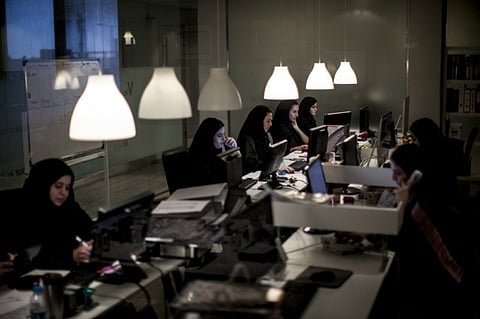In taking jobs, women take on a Saudi taboo
Harvey Nichols store in Riyadh serves as a pioneering case, benefiting from a small staff

Riyadh: The religious police were not the ones who chastised the princess running the Harvey Nichols department store here when she decided to enhance the upscale shopping atmosphere with some instrumental lute music.
Instead, the irate caller accusing the store of anti-Islamic behaviour was a frequent shopper, a woman who on average spent $13,000 per visit.
“Maybe I should get whale sounds,” said the princess, Reema Bint Bandar Al Saud, making light of the blowback that business people in the conservative kingdom often face when making even glacial changes to how things are done.
But this is part of being a pioneer in Saudi Arabia, where women are severely restricted in all public activities.
Despite her royal credentials, the princess did away with the music, but has pushed ahead on the equally touchy front of hiring women as sales clerks. This step — or leap, in the Saudi context — not only seeks to shift social conventions but also to aid the country’s long-term economic health.
Setting an example
At Harvey Nichols, several dozen female clerks were spread throughout the store. They were busy arranging dresses, hawking cosmetics and swiping credit cards. Just two years ago there were only a few women working here.
The kingdom’s restrictions on women have long drawn the condemnation of rights groups, most recently after dozens of women drew headlines by defying a ban on driving.
But some women’s rights advocates here say that the international attention given to small numbers of women getting behind the wheel overshadows the deep, if gradual, shifts in Saudi society as more women work, broadening their range of experience, helping to run organisations and earning a degree of economic independence.
Although the effort has been promoted by the Ministry of Labour as part of a campaign to reduce unemployment and the dependence on foreign workers, it has butted up against strict social codes. The percentage of Saudi women who work remains minuscule by world standards, at about 15 per cent.
Separate break rooms
Still, many employers say they prefer hiring Saudi women to Saudi men; they have added separate break rooms and office areas for women, and have installed partitions and cameras to prevent unwelcome mingling.
“We are promoting recruitment of Saudi women because they have a low level of attrition, a better attention to detail, a willingness to perform and a productivity about twice that of Saudi men,” said a grocery store manager.
Despite that, Saudi women comprise less than 5 per cent of his staff of more than 1,000 because of social taboos in many areas. He spoke on the condition that neither he nor his company be identified to avoid being targeted by opponents of women’s employment.
While working women in the Red Sea city of Jeddah are relatively accepted, he said, the addition of female checkout clerks in a more conservative city caused such an uproar that a local prince intervened and paid the women’s salaries for more than a year — as long as they stayed home.
Others have found business opportunities in bridging the gap between employers and women.
“For some employers, it is their first time to hire women and they don’t know how to deal with them,” said Khalid Al Khudair, 30, who runs a women’s employment service called Glowork that cooperates with the government to boost female employment.
Frosted glass partitions bearing inspirational quotes divide the company’s pink-walled office in Riyadh. On a recent morning, a dozen female employees sipped coffee as they sorted through applicants’ resumes on flat-screen monitors. All wore loose black gowns, some with their hair uncovered — a rare but increasingly common site in some private offices.
In two years, the company has found jobs for more than 10,000 women. Yet across the kingdom, about two-thirds of female university graduates are unemployed, showing that the labour market has yet to catch up with huge advances in women’s education.
Social experiment
Some Saudis laud King Abdullah Bin Abdul Aziz as a reformer for appointing 30 women to a royal advisory council and granting women the right to run and vote in municipal elections.
Harvey Nichols has served as a pioneering case, benefiting from a small staff, ample resources and, of course, a royal boss. “This store is a big social experiment because we are talking about ladies who had severe obstacles in coming here,” said Reema, 38, who was educated in the US while her father, Prince Bandar Bin Sultan, served as ambassador.
Leading a visitor through her now music-free store, she explained that she had opened a nursery for employees’ children and given transport stipends to women who could not drive themselves to work.
The store does not regulate face veils, she said, adding that some women prefer to cover their faces at work.
Two years ago, the store employed only 12 Saudi women, she said, including herself. That number has nearly quadrupled since then, she said.
Jawharah, a 35-year-old saleswoman, said this was her first job and that her husband had inspected the store before letting her take it.
— New York Times News Service
Sign up for the Daily Briefing
Get the latest news and updates straight to your inbox



